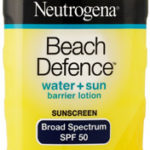If we were to quiz you on your sunscreen knowledge right this very second, would you pass? Or would you fail miserably? Considering excessive sun exposure can cause cancer and accelerate skin ageing, it’s important all of us scrub-up on our sunscreen facts before the peak of summer hits.
Below is what we like to call a little lesson in sunscreen. Yes, by the end of it you will know your UVAs from your UVBs, and you’ll also know which SPF you should be reaching for when it comes to purchasing your perfect summer sunscreen…
4 THINGS YOU REALLY NEED TO KNOW ABOUT SUNSCREEN
#1. The difference between UVA and UVB rays
According to Dr Saxon Smith, Dermatologist Gosford and Sydney, the sun produces three forms of ultraviolet radiation – UVA, UVB and UVC – however only UVA (ageing) and UVB (burning) rays reach the earth’s surface. Both of these cause damage to our skin. “UVB rays penetrate the top layers of the skin, causing the immediate effect of acute sunburn,” he says, however, the long-term effect is much worse, as UVB rays can cause cancer by damaging the DNA in your skin cells. “UVA rays, on the other hand, penetrate deeper into the skin layers, and cause the relatively immediate effect of a sun tan.” While this may seem like a good thing to some, it’s definitely not, as these UVA rays also accelerate skin ageing by altering your collagen production. Dr Saxon also says UV light decreases your body’s ability to recognise and repair damaged skin cells, which is why it’s even more important to wear sunscreen on a daily basis.
#2. What the words ‘broad spectrum’ mean
It’s worth noting that not all sunscreens are the same. As we just mentioned, there are two types of UV radiation that damage our skin – UVA and UVB rays – but as Dr Saxon explains, the numbered SPF (Sun Protection Factor) on a sunscreen only indicates how much the product will protect your skin from UVB rays. “However, a broad spectrum sunscreen protects against UVA as well as UVB,” he adds. This means it helps to combat sunburn as well as free radicals, which cause premature ageing through collagen destruction. We recommend always purchasing a sunscreen with broad-spectrum protection, as you will not be protected from UVA rays if you don’t.

Two must-have broad-spectrum sunscreens for summer: NEUTROGENA Beach Defence
Sunscreen Lotion and NEUTROGENA Beach Defence Sunscreen Spray.
#3. The difference between SPF 15, SPF 30 and SPF 50+
The SPF rating on a sunscreen indicates how much the product will boost your skin’s own sun protection. If it takes 10 minutes for your bare skin to burn, an SPF 15 will offer 15 times that, effectively giving you 150 minutes in the sunshine before you start to burn. Using that same equation, an SPF 30 will allow you to safely spend 300 minutes in the sun, or 500 minutes if you’re wearing an SPF 50+. Their differences go beyond this, though. “The increase in SPF also indicates how much UV light is being blocked, or conversely, how much UV light is still getting through,” says Dr Saxon. “An SPF 30 sunscreen blocks 96.67 per cent of UV light getting to the skin and lets 3.33 per cent get through. An SPF 50+ blocks 98.33 per cent, letting only 1.67 per cent through to the skin. Therefore, an SPF 50+ lets 50 per cent less UV light through.”
#4. How to correctly apply and reapply your sunscreen
Those skipping their daily sunscreen application, listen up: “In order to minimise your personal risk of skin cancer and the cumulative skin ageing effects of the sun’s ultraviolet rays, you should apply sunscreen every day to your face and neck – rain, hail or shine,” stresses Dr Saxon. Just make sure you do so around 15-30 minutes before going outside as it takes this long for the product to dry and be absorbed by the skin. And if you’re swimming or sweating heavily, be sure to reapply your sunscreen every two hours, as sunscreens tend to breakdown under these conditions, making them less effective at protecting your skin.
Do you consider yourself to be sunscreen savvy? Did you know that only broad-spectrum sunscreens protect you from both UVA and UVB rays? Will you be making an effort to purchase an SPF 50+ from now on?







